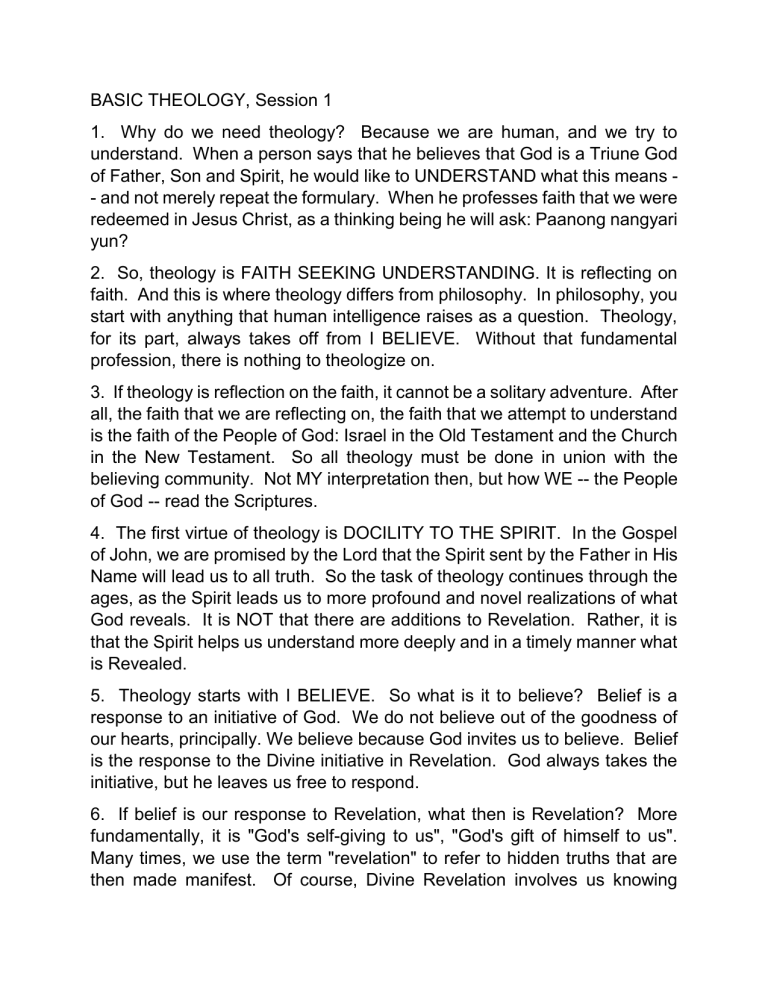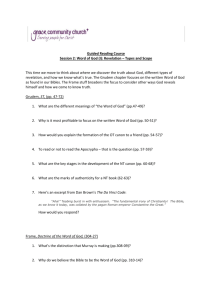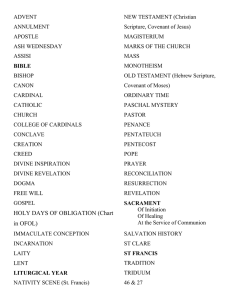
BASIC THEOLOGY, Session 1 1. Why do we need theology? Because we are human, and we try to understand. When a person says that he believes that God is a Triune God of Father, Son and Spirit, he would like to UNDERSTAND what this means - and not merely repeat the formulary. When he professes faith that we were redeemed in Jesus Christ, as a thinking being he will ask: Paanong nangyari yun? 2. So, theology is FAITH SEEKING UNDERSTANDING. It is reflecting on faith. And this is where theology differs from philosophy. In philosophy, you start with anything that human intelligence raises as a question. Theology, for its part, always takes off from I BELIEVE. Without that fundamental profession, there is nothing to theologize on. 3. If theology is reflection on the faith, it cannot be a solitary adventure. After all, the faith that we are reflecting on, the faith that we attempt to understand is the faith of the People of God: Israel in the Old Testament and the Church in the New Testament. So all theology must be done in union with the believing community. Not MY interpretation then, but how WE -- the People of God -- read the Scriptures. 4. The first virtue of theology is DOCILITY TO THE SPIRIT. In the Gospel of John, we are promised by the Lord that the Spirit sent by the Father in His Name will lead us to all truth. So the task of theology continues through the ages, as the Spirit leads us to more profound and novel realizations of what God reveals. It is NOT that there are additions to Revelation. Rather, it is that the Spirit helps us understand more deeply and in a timely manner what is Revealed. 5. Theology starts with I BELIEVE. So what is it to believe? Belief is a response to an initiative of God. We do not believe out of the goodness of our hearts, principally. We believe because God invites us to believe. Belief is the response to the Divine initiative in Revelation. God always takes the initiative, but he leaves us free to respond. 6. If belief is our response to Revelation, what then is Revelation? More fundamentally, it is "God's self-giving to us", "God's gift of himself to us". Many times, we use the term "revelation" to refer to hidden truths that are then made manifest. Of course, Divine Revelation involves us knowing certain "truths" -- but more fundamentally, it is God offering us a share in his life, in the fullness of his Being, and in his love. Just as a friend who shares himself with you allows you to say some things about him, so to, God's gift of himself to us allows us to affirm some truths about God. 7. How does this Revelation take place? First of all, God manifests himself and reveals his will in the splendor, beauty, magnificence of creation. So the reasonable person can be led to a realization that there exists a good, benevolent, powerful God from all that he sees in creation. But God reveals himself more fully in the EVENTS and WORDS recorded in Sacred Scripture -- in the Old Testament and in the New Testament. Revelation reaches its peak in the Word who became flesh: Jesus the Lord. 8. Clearly then, Revelation cannot come from us. We are only HEARERS OF THE WORD. We are recipients. We stand before Revelation with open hands. It is not for us to say what Revelation should be. Revelation is received as a gift. That also means that no matter how studiously you may analyze the human situation, you will never arrive at Revelation. The study of the human person can never yield the God who freely offers himself to us. 9. The revelation here that we talk about is the Revelation in the Old Testament and in the New Testament -- public revelation. Let us remind ourselves that Revelation is addressed to a believing community, so even the words, the stories, the events recorded in Scriptures are to be understood as the believing community understands them. Repeat: Theology is not your SOLITARY venture. It is the endeavor of an entire community to understand the faith. In respect to so-called "private revelations" -- such as those made by the Blessed Mother at Fatima, Lourdes, or revelations made to some saints like Maragret Mary Alacoque, none of these is mandatory on the faithful. The faithful may or may not accept them. When the Church passes judgment on them, it is merely to say that there is nothing harmful to the faith, should the believer choose to accept them.




